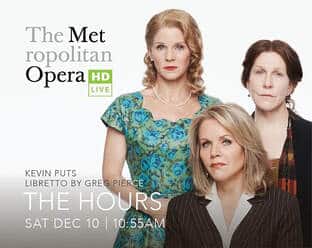The Met refuses a donation
mainFrom one of our correspondents:
I just got a fundraising call from the Met Opera. They had some sort of matching grant and were selling memberships to the Met Opera Guild, minimum membership level of $75. I said I couldn’t do that today but I’d be happy to donate $25. Embarrassed, he said “Sorry we can’t accept donations on that level. Thank you and have a good day.” I stopped the guy and said “You are refusing to take a donation?” and the guy simply said “I’m not in charge. Goodbye.”

Can that really be policy?





How ridiculous! The Akron Symphony will gladly accept your donation if you wish!
– Paul Jarrett, Executive Director
Same exact thing happened to me! I try to donate to everyone who asks, so I often get a lot in a week, and rather than not giving anything, I’d rather just give a few bucks: the price of a coffee (which I still end up buying later that day). I was promptly informed that $5 was too low of an offer to accept. After telling her “Ok, well, good luck,” she let me know that she would talk to her manager and see if it were possible. A few more back and forth comments and she said it would be ok… but it was a bit ridiculous in the first place.
Please, please, consider us! 🙂 Opera in Williamsburg, Virginia — http://www.operainwilliamsburg.org — a young and excellent opera company where no opera was performed before. Your donation will go a long way. Most of our budget by far goes to our singers and musicians, which is the way it should be.
Only Juilliard’s Development Department is more obnoxious. Just this week, they made sure they’ll never get another 4-figure check, or one of any size, from me. Like the Met, they’re using people who should never be allowed near a telephone. If they don’t need the money, great, I know a lot of organizations who will appreciate even a small check, and then work their behinds off to be nice in the hope that there will be increased support over the coming years. When the Met declares bankruptcy in a few years, we’ll know they worked hard to achieve that disaster.
Bravo, Jane!
If $25 is not worth accepting it makes me wonder what their overhead and fundraising are that make it so.
Could it cost $25 in time and accounting costs for every donation that comes in?
For the Metropolitan Opera I’d gladly give $75 (or more) and I do. The call you received was to join the Gulld, not to make a donation. You’re free to do that anytime, and they will gladly accept it.
Yes, it’s Met policy. For Guild membership, donations of $75.00 and higher are accepted. This is the minimum amount. I know it’s frustrating to some, but in order to keep an institution such as this running, they have established this as their lowest amount for donations.
You’ve stated the how, but not the why.
brooklyn Art song society would gladly and gratefully accept tax-deductible donations of any size for those who want to support vocal music. http://Www.brooklynartsongsociety.org
Not that what happened here was a good thing, but there are a few things to keep in mind.
1. The Metropolitan Opera and the Metropolitan Opera Guild are, organizationally speaking, separate entities with separate fundraising staffs. (Many, many people do not realize this, and that confusion seems to suit both entities well enough that neither wants to take the trouble to dispel it.) The call in this story was evidently on behalf of the Guild and not the opera house.
2. It’s very possible that the actual caller was not employed by the Met Opera Guild itself, but rather by a marketing contractor the Guild hired to make telephone calls for this campaign. This is a very common practice in the arts world in New York City (and possibly beyond); I’ve known at least half a dozen people who have worked for such companies making calls like this.
3. The caller was “selling memberships to the Met Opera Guild, minimum membership level of $75.” So, strictly speaking, this caller wasn’t soliciting donations; he was selling a good (membership in the Guild). Chances are – especially if he worked for a marketing contractor – that he literally had no mechanism for accepting and processing donations that weren’t Guild memberships.
Sure, the caller shouldn’t have handled the situation the way he did. If my no. 3 is correct, he should – ideally – have explained the situation roughly as I did and directed the would-be donor to the Guild or the Met Opera website.
But things in the real world aren’t ideal, and the caller had to do what his bosses trained him to do and not do or say anything off-script or off-message. If the person you called isn’t buying, get off the call and dial the next phone number on the list. (That would be why he said, “I’m not in charge. Goodbye.”)
That caller wasn’t going to be judged by his bosses – or his bosses by the client who contracted them – by how helpfully he handled requests or questions that came up; they were going to be judged by how many Guild memberships they sold and how many calls they made – and nothing else.
Excellent answer.
It should be noted that telefundraising always results in more than 50% of the donor’s money vanishing in admin and commissions.
It probably costs them more in handling fees than the meager donation would cover.
Dear Mr Lebrecht,
I hope your correspondent will accept the Metropolitan Opera’s sincere apologies for the information he or she received when offering to make a donation of $25. The representative that he or she spoke with on the phone was rather new to that position and still in training. We do indeed have a challenge grant in place that is matching all new membership gifts. Memberships offer a variety of benefits that include a full year’s subscription to Opera News magazine, and do in fact begin at $75. Clearly, the representative should have understood that your correspondent was not interested in joining as a member. We are delighted to accept donations of any amount and would be grateful to count your correspondent among the Met’s supporters.
Judith Helf
Director of Development
The Metropolitan Opera
Since all I have to go on is “some sort of matching grant,” I am withholding at least a bit of judgment on this one. Depending on the terms of the “matching grant,” the person or persons who started the whole thing (or even an outside organization or corporation) *may* have laid down rules of how the match was to be made. Generally, the match would be on the total amount of money raised, but there’s no guarantee. I say this because of experiences as director of a public library, which (the library) very occasionally benefits from matching gifts from a large corporation and its employees. Each match has to be precise dollar to precise dollar. So it is *possible* that the rules of the game–and it is a kind of game, in these United States, when it comes to arts-related funding–could have been unfair vis-a-vis acceptable donations. And–I could be wrong….
I am a member of the Metropolitan Guild at a modest level. While it is true that the Met Opera and Met Guild are separate entities, it has always been my understanding that the Guild “donates” a high percentage of their donations to the Met Opera itself. At least I hope so! Sometimes it is good to give just to give. Hope arts organizations are doing the right thing when I donate some on my rather limited income. If they are not, shame on them! But I tend to give them the benefit of the doubt.
Yes, the Guild does give the great majority of its donated income to the Metropolitan Opera; that’s what it was created to do.
But, as you confirm, they are separate entities, so it’s no good blaming the Met (as this post and some of its commenters did) for something done by an employee or contractor of the Guild.
– – – – – – – – – –
It’s also no good, by the way, describing the Guild’s magazine – Opera News – as “the house organ of the Metropolitan Opera”, as sometimes happens.
Remember when, a few years ago, after a harsh review of a Met production in Opera News, Peter Gelb declared that the Met would no longer give press tickets to Opera News critics and wanted no more reviews of his company to appear in the magazine? Don’t forget what happened next: the Guild – the actual publisher of Opera News – publicly mulled dropping the words “Metropolitan Opera” from its name and formally changing its mission to supporting opera all over the United States rather than primarily at one company.
Gelb changed his mind.
Obviously, serious lack in training is the issue here. “I am sorry to let you know the minimum level for the Opera Guild is 75 dollars, but I am happy to accept your offer as a donation for the Metropolitan Opera. Thank you for your support. How would you like to proceed with your gift?” It is simple, really. If one has had some good training…
Except that the caller was working for the Guild (or the Guild’s contractor) and was probably not equipped, or even allowed, to accept donations to another organization (the Metropolitan Opera).
Um.
The key here is not “joining the Guild,” but offering a donation of $25. Any organization that can afford to refuse a donation dies not need my support.
Unfortunately, I used to work at The Metropolitan Opera where we’d call 200+ people a day asking about our membership program and most of what MWnyc say is true, although the callers weren’t marketing contractors hired by The Guild, they were Met employees in the telefunding department. As someone who spent some time there, I can tell you that the department is super toxic, unprofessional, and doesn’t allow for professional growth for the employees.
1. Our job is to call people, and that limit of communication inhibits our ability to make a sale simply because we can’t do anything else such as emailing them more information about donating, meet with them, or even had an extension number in the office.
2. They gave the best call leads (rich people who donate) to the caller that they liked, and blamed our “bad sales skills” on the rest of us when we were unable to keep someone on the phone for more than 15 seconds. I’ve seen colleagues of mine who’ve been there for 7+ years call the same people who didn’t care about donating as I (someone who just started) while there are people who have been there for a year and a half was assigned to calling rich people that typically donate to The Met.
3. I’ve seen the higher ups go out of their way to prevent top earners from being promoted simply because the higher ups would lose their jobs if the tops earners left the department. Keep in mind, at that job you don’t qualify for ANY benefits like health insurance until after your first year and even then you must work roughly 27-28 hours a week at minimum wage in order to maintain it. So of course if someone’s been working there for 3 years, they’d want to be promoted doing roughly the same thing for more money and an office instead of sitting at a cubicle all day.
4. The higher ups had it our for our union representatives and oh did they get rid of them as soon as they saw a chance, even when it was something as simple as reporting a top earner to HR.
All in all, it was one of the worst jobs out of college and I’m glad it’s been a while since I had to deal with those people again. Although this doesn’t represent The Met Opera as a whole, it sure is enough to see what it’s like working a telefunding job for the non-profit and understand how toxic and problematic certain Met Opera departments can be.